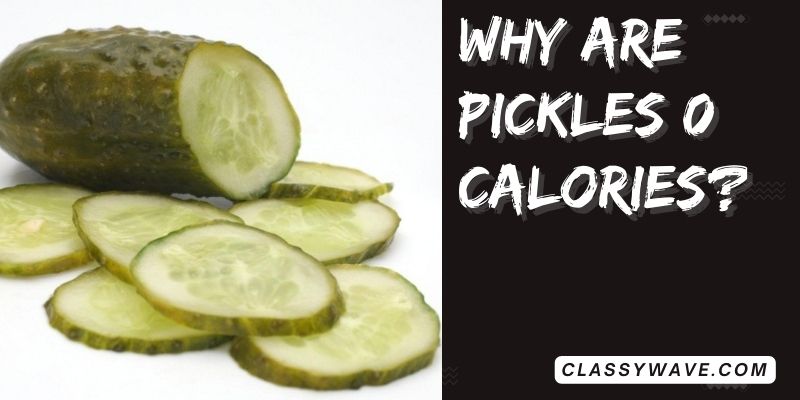why are pickles 0 calories? Pickle Paradox
Pickles, those tangy and crunchy delights, have long been a staple in many cuisines around the world. While they add a burst of flavor to sandwiches and burgers, it’s their claim to fame that truly intrigues health-conscious individuals: zero calories.
In this article, we delve into the fascinating world of pickles to uncover the reasons behind their low-calorie status and explore the unexpected health benefits that come with indulging in these briny treats.
The Pickle Paradox: Zero Calories Explained
Caloric Content of Pickles:
It’s a widely accepted fact that pickles contain minimal to zero calories. The primary reason behind this phenomenon is the pickling process. When cucumbers transform into pickles, they undergo fermentation or brining, resulting in a negligible calorie count. This low-calorie profile makes pickles an attractive option for those seeking flavorful snacks without compromising their dietary goals.
Water Content and Fiber:
Cucumbers, the main ingredient in pickles, have a high water content, contributing to the overall low-calorie count. Additionally, the pickling process retains the fiber content of cucumbers, which not only aids in digestion but also provides a feeling of fullness without the calorie load.
Health Benefits of Pickles:
Probiotic Power:
Fermented pickles, particularly those made through traditional methods, are rich in probiotics. These beneficial bacteria promote gut health by maintaining a balanced microbiome. A healthy gut is linked to improved digestion, a stronger immune system, and even positive effects on mental health.
Nutrient Retention:
Contrary to the misconception that pickling strips vegetables of their nutrients, the process can actually preserve certain vitamins and minerals. Pickles are a good source of vitamin K, which is crucial for bone health, and they retain minerals like potassium and magnesium.
Low-Calorie Crunch:
For individuals on a weight management journey, pickles offer a satisfying crunch without the guilt of added calories. Snacking on pickles can help curb cravings and contribute to a sense of fullness, making it easier to adhere to a calorie-controlled diet.
Hydration Boost:
The high water content in pickles contributes to hydration, an essential aspect of overall health. Staying hydrated is linked to improved skin health, enhanced cognitive function, and better regulation of bodily functions.
Blood Sugar Regulation:
Some studies suggest that vinegar, a common component in pickle brine, may have a positive impact on blood sugar levels. This could be beneficial for individuals with diabetes or those looking to manage their blood sugar levels.
Decoding the Pickling Process:
Understand how the pickling process, involving fermentation or brining, results in the remarkable characteristic of pickles having almost zero calories.
Cucumbers: The Calorie-Saving Heroes:
Investigate the low-calorie foundation of pickles by examining the high water content and fiber retention in cucumbers.
Health Benefits of Pickles:
Probiotic Powerhouse:
Delve into the world of probiotics found in fermented pickles and their positive impact on gut health, digestion, and overall well-being.
Nutrient Preservation in Pickles:
Challenge the misconception about nutrient loss in pickling and discover how pickles can actually preserve essential vitamins and minerals.
Low-Calorie Crunch for Weight Management:
Explore how the satisfying crunch of pickles, combined with their low-calorie nature, makes them an ideal snack for those on a weight management journey.
Hydration from Crunchy Bites:
Discuss the hydration benefits of pickles, emphasizing the role of their high water content in promoting overall health.
Blood Sugar Regulation and Vinegar:
Examine the potential positive effects of vinegar in pickle brine on blood sugar levels, making pickles a potentially beneficial addition for those managing diabetes.
Unexpected Delights in Every Bite:
Beyond the Basic Pickle:
Explore the diverse world of pickles, from classic dill to exotic kimchi, and uncover unique flavors and nutritional profiles.
Incorporating Pickles into Everyday Meals:
Provide practical tips on how to incorporate pickles creatively into meals to enhance flavor and nutrition.
Conclusion:
Pickles boast a near-zero calorie count due to the pickling process, maintaining cucumbers’ high water content and fiber. Beyond their low-calorie crunch, pickles offer probiotic benefits for gut health, retain essential nutrients, aid in hydration, and may contribute to blood sugar regulation. Exploring diverse varieties, from classic dill to exotic kimchi, pickles add unique flavors and nutritional value to meals. Their versatility makes them a practical and flavorful addition for those seeking a healthy, satisfying snack or a creative meal enhancement.
FAQs
Question: Are pickles really zero calories?
Answer: Yes, pickles are nearly calorie-free due to the low-calorie nature of cucumbers and the pickling process.
Question: How do pickles maintain zero calories after pickling?
Answer: The pickling process preserves cucumbers’ high water content and fiber, resulting in minimal caloric content.
Question: Do pickles lose nutrients during pickling?
Answer: Contrary to belief, pickles can retain essential nutrients, providing vitamin K, potassium, and magnesium in the pickled form.
Question: Can pickles aid in weight management?
Answer: Yes, pickles offer a satisfying crunch with minimal calories, helping curb cravings and support weight management efforts.
Question: Are there health benefits to eating pickles?
Answer: Absolutely, pickles can promote gut health, and hydration, and potentially aid in blood sugar regulation, offering various unexpected health advantages.







